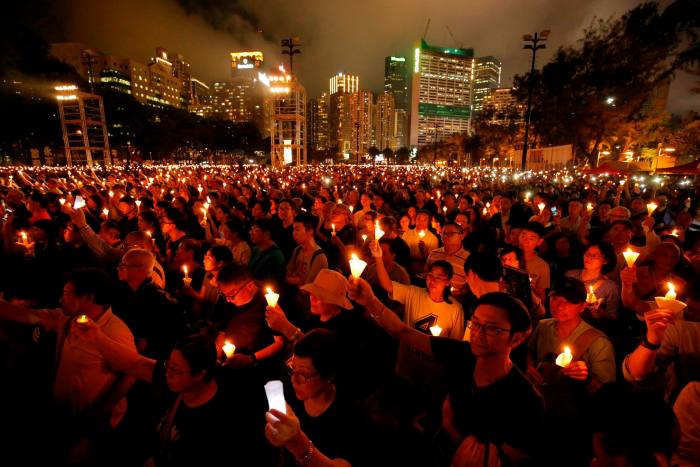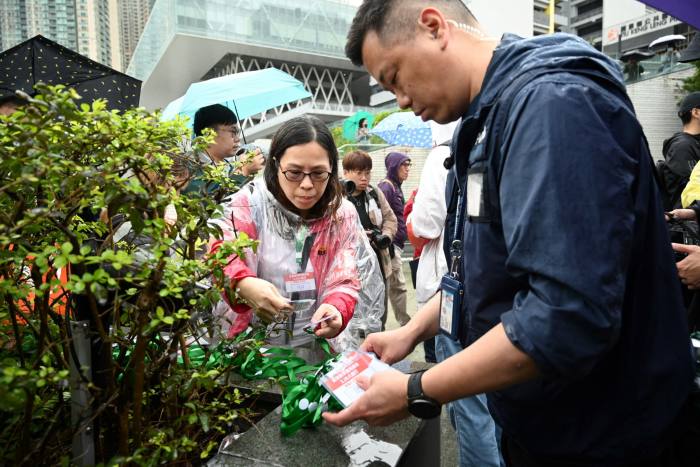With two uniformed police officers filming, pro-democracy political activist Chan Po-ying used a megaphone to call on passers-by in a busy shopping district in Hong Kong to “commemorate in their own ways” the 1989 massacre of protesters in Beijing’s Tiananmen Square.
Chan was one of a half dozen people from the League of Social Democrats, one of the territory’s few remaining pro-democracy political parties, at the small booth last weekend. Their stand, a far cry from the thousands-strong rallies they used to command, reflect the limited space for dissent in Hong Kong, once home to a vibrant protest culture.
Hong Kong was known for holding the biggest Tiananmen remembrance event on Chinese territory, drawing tens of thousands of people to candlelight vigils. But after a crackdown on pro-democracy protests and the introduction of a sweeping national security law by Beijing in 2020, dissent has been stamped out, and while all pandemic-related restrictions are gone, this year’s June 4 anniversary will scarcely be noted.
The disappearance of almost any type of protest from the city since the security law was introduced illustrates how freedom of expression, once a hallmark of the Asian financial hub’s success alongside the rule of law, is under severe attack.
“The right of demonstrations, the right of freedom of expression of different views from the government which were guaranteed by the Basic Law [Hong Kong’s mini constitution] . . . I think it’s totally gone,” said Willy Lam, an expert in Chinese politics at the Jamestown Foundation think-tank in Washington.
Over the past three years, more than 60 civil society organisations have folded, including trade unions, pro-democracy media outlets and major opposition political parties. Police in early May took possession of the “Pillar of Shame”, a statue commemorating the Tiananmen victims, once on display in a university. Books related to the massacre have been removed from public libraries. The city’s Catholic Diocese confirmed to the Financial Times that it would not hold commemorative masses for the second consecutive year.
During a rare visit in April, Beijing’s top bureaucrat overseeing Hong Kong, Xia Baolong, said protests were “not the only way” to express dissent.

Asked on Tuesday by reporters if it was legal for people to mourn the massacre individually, John Lee, the city’s leader, said: “Everybody should act in accordance with the law and think of what they do, so as to be ready to face the consequences.”
“The police will take action resolutely,” he added.
Last year, authorities arrested six people near Victoria Park after closing the traditional vigil site, including a veteran activist who wore a mask with the words “mourning June 4”. Some people held electric candles and mobile phone lights outside the park.
Several activists have been asked by police officers about their plans for June 4 this year, two activists said.
Anyone holding a protest with more than 30 people has to apply for police permission. Of the 26 public procession permits granted by police in May, more than 70 per cent were for religious events such as fundraising walks. None were held by political parties.
In March, police told the organiser of a small protest against land reclamation to cap the number of participants at 100 and have them all wear number tags. All permits now include a clause prohibiting “activities contrary to the interests of national security”.
When two trade union activists applied to hold a protest on May 1, Labour Day, Joe Wong, a trade unionist, was taken away by police, according to people close to him. Wong withdrew the application for protest. He did not share why. After he emerged, Denny To of the Cleaning Industry Service Workers Union, said Wong had suffered an “emotional breakdown”.
Wong has been told his bank account with the Bank of China would be closed because he failed to pass its risk assessment, according to To. The bank did not respond to a request for comment.

The League of Social Democrats said police pressured members to not participate in a women’s rights protest on March 8. Despite initially being granted a permit, the Hong Kong Women Workers’ Association cancelled the event. Police told reporters that “violent groups” might have disrupted the march.
In response to questions from the FT about recent planned marches, the questioning of activists and filming of the League of Social Democrats, Hong Kong police said they would “implement appropriate measures to regulate public events in accordance with the laws”, including a “comprehensive risk assessment”. They added that the force would take “appropriate actions according to the actual circumstances and handle Police’s work according to the laws”.
“We would not see any mass protests and assemblies — such as the annual July 1 protests [on the anniversary of the handover from the UK to China] and June 4 vigils — in the foreseeable future,” said To. “There are many more constraints now . . . and it is particularly difficult to hold protests if the [applicants] are politically sensitive persons.”
Similar to other pro-democracy political groups and unions, the League of Social Democrats has seen volunteer numbers and fundraising dwindle. Chan’s husband, Leung Kwok-hung, also known as “Long Hair”, is standing trial in a landmark security case alongside 46 other opposition activists. HSBC has closed the party’s bank account, according to Dickson Chau, a member of the group, who showed the FT the letter received from the bank.
An HSBC spokesperson said the bank “regularly reviews customers’ account activities and relationships as part of ongoing customer due diligence requirements”.
“Based on these reviews, HSBC may decide that we will no longer be able to maintain the banking relationships with certain customers,” the bank said.
“Where can we bring our money to? Will the next institution have to bear additional legal risks? The pressure from authorities and non-government institutions is simply continuously increasing,” said Chau.
The outlook for Hong Kong’s once-thriving protest movement is bleak, analysts said. At the League of Social Democrats stand in Causeway Bay, most people paid no attention to Chan’s exhortations to mark the anniversary. A pro-Beijing group is expected to hold a “Hometown Market Carnival” in Victoria Park on June 4.
Despite the difficult environment, Chau and To said they were committed to campaigning on social issues such as labour rights. “We still have to continue our work,” Chau said. “There is still meaning for us to exist.”












